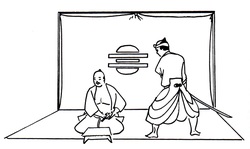 In Feudal Japan, samurai warriors committed a form of ritualistic suicide known as seppuku or harakiri for a long list of reasons. However, the original (overriding) purposes was to "to follow one's master in death" or "maintain full command over one's own destiny to the very last" (1). For the Christian, the literal practice of seppuku is unthinkable, but the spiritual practice is paramount...(click "Read More" for entire article) We were under great pressure, far beyond our ability to endure, so that we despaired of life itself. Indeed, we felt we had received the sentence of death. But this happened that we might not rely on ourselves but on God, who raises the dead. He has delivered us from such a deadly peril, and he will deliver us again. On him we have set our hope that he will continue to deliver us, as you help us by your prayers. (2 Corinthians 1: 8b-11a) The significance of the samurai's undying fealty carries through to our sacrificial loyalty to our Lord and savior Jesus Christ. The sacrament of baptism parallels the first purpose of seppuku in desiring to follow our master into death. Some do pay the ultimate price to follow Christ in martyrdom. Ironically, the Christian's goal of seppuku is opposite of the second goal of the samurai's, since Christ calls us to surrender command of our destiny to him. History teaches us what results when man commands his own destiny. His desires lead to money, sex and power, which all inevitably violate human life resulting in enslavement, degradation, and oppression. In the end, the man is forgotten, or wished he could be. Instead, Christ tells his disciples to forsake the world, dying to self like a single seed that produces many seeds if it falls to the ground and dies. Instead of the fleeting and vain existence of a carnal creature, we're offered a place and a purpose if we join with Christ, as he told his disciples, "the man who loves his life will lose it, while the man who hates his life in this world will keep it for eternal life" (John 12:25). In addition, Paul reveals that this death to sin causes us to become alive in Christ Jesus (Romans 6:11). Just as nature abhors a vacuum and races to fill it, so does a voluntary death create the necessary space for Christ to live in us and through us. 2 Corinthians 4:10 states that "we always carry around in our body the death of Jesus, so that the life of Jesus may also be revealed in our body." The power of Christ's Kingdom is available to those who live in him (and vis versa). The difficulty of allowing Christ to lead through us is continually dying to self. The samurai didn't have to worry about committing seppuku more than the first time, but since the Christian's seppuku is spiritual it must be re-administered...daily. The power of God fades when we leave his purpose. Failed ministers attest that it is easy to retake command of our destiny and seek money, sex and power, but this time in the name of God causing even greater destruction. It is only in our perpetual "death" that we will no longer rely on ourselves, but on Christ to act through us. Then and only then will our leadership and our ministry truly begin. However, when we have tasted the power of shifting our reliance from ourselves and begin to see that shift occur in others, there is nothing Christ can't do through his ministry. Roy King statement captures this death to self in his principle that leadership in "ministry always involves me offering God a voluntary death to self and seeing him give resurrection life." (2). But what does spiritual seppuku look like? Ask who is truly in control of our lives. Meditate on what pride looks like in our lives.There may be specific things in our lives that we need to die to. Here is Peter Scazzero's list of things to die to get started:
----
1 - Ratti, Oscar. Westbrook, Adele. Secrets of the Samurai. Castle Books. 1973. pg 93 2 - Roy King. Biblical Foundations of Leadership. Class Exercises. 12-29-2010
0 Comments
Leave a Reply. |
AuthorBrett Yardley: Categories
All
Archives
January 2019
|

